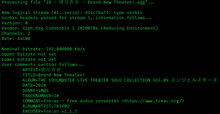 | |
| Filename extension |
.ogg[1] |
|---|---|
| Internet media type |
application/ogg, audio/ogg, audio/vorbis, audio/vorbis-config |
| Developed by | Xiph.Org Foundation |
| Initial release | May 8, 2000[2][3] |
| Latest release | Vorbis I July 4, 2020[4] |
| Type of format | Lossy audio |
| Contained by | Ogg, Matroska, WebM |
| Standard | Specification |
| Open format? | Yes[5] |
| Free format? | Yes[6] |
| Website | https://xiph.org/vorbis/ |
 | |
| Developer(s) | Xiph.Org Foundation |
|---|---|
| Initial release | July 19, 2002 |
| Stable release | 1.3.7
/ July 4, 2020[7] |
| Written in | C |
| Type | Audio codec, reference implementation |
| License | Modified BSD license[8][9] |
| Website | Xiph.org downloads |
Vorbis is a free and open-source software project headed by the Xiph.Org Foundation. The project produces an audio coding format and software reference encoder/decoder (codec) for lossy audio compression, libvorbis.[10] Vorbis is most commonly used in conjunction with the Ogg container format[11] and it is therefore often referred to as Ogg Vorbis.
Vorbis is a continuation of audio compression development started in 1993 by Chris Montgomery.[12][13] Intensive development began following a September 1998 letter from the Fraunhofer Society announcing plans to charge licensing fees for the MP3 audio format.[14][15] The Vorbis project started as part of the Xiphophorus company's Ogg project (also known as OggSquish multimedia project).[16][17] Chris Montgomery began work on the project and was assisted by a growing number of other developers. They continued refining the source code until the Vorbis file format was frozen for 1.0 in May 2000.[2][3][18] Originally licensed as LGPL, in 2001 the Vorbis license was changed to the BSD license to encourage adoption, with the endorsement of Richard Stallman.[19][20] A stable version (1.0) of the reference software was released on July 19, 2002.[21][22][23]
Since February 2013,[24] Xiph.Org has stated that the use of Vorbis should be deprecated in favor of the Opus codec, which is also a Xiph.Org Foundation project and also free and open-source. Compared to Vorbis, Opus can simultaneously achieve higher compression efficiency—per both Xiph.Org itself and third-party listening tests[25][26]—and lower encode/decode latency (in most cases, low enough for real-time applications such as internet telephony or live singing, rarely possible with Vorbis).[27]
- ^ "MIME Types and File Extensions - XiphWiki". wiki.xiph.org.
- ^ a b Montgomery, Christopher (May 8, 2000). "Merge done". vorbis-dev. Retrieved September 3, 2009.
- ^ a b "Ogg Vorbis". Xiph.Org Foundation. Retrieved September 11, 2009.
- ^ Xiph.Org Foundation (January 20, 2012). "Vorbis I specification". Xiph.Org Foundation. Retrieved January 31, 2012.
- ^ "PlayOgg! - FSF - Free Software Foundation". March 17, 2010. Retrieved October 1, 2013.
- ^ Ogg Vorbis Audio Format (Full draft). Sustainability of Digital Formats. Washington, D.C.: Library of Congress. February 19, 2008. Retrieved December 13, 2021.
- ^ Giles, Ralph (July 4, 2020). "[Vorbis] vorbis 1.3.7 release".
- ^ Cite error: The named reference
Vorbis.com FAQwas invoked but never defined (see the help page). - ^ "Sample Xiph.Org Variant of the BSD License". Xiph.Org Foundation. Retrieved August 29, 2009.
- ^ Xiph.Org (January 22, 2014). "libVorbis 1.3.4 released". Retrieved February 9, 2014.
- ^ "MIME Types and File Extensions". Xiph.org wiki. Retrieved October 13, 2007.
- ^ "Interview: Christopher Montgomery of Xiphophorus". Advogado. April 4, 2000. Archived from the original on June 28, 2017. Retrieved September 2, 2009.
- ^ "naming". Xiph.Org Foundation. Archived from the original on April 11, 2020.
- ^ "About". Xiph.org. Retrieved August 31, 2009.
- ^ Robertson, Michael (September 11, 1998). "Fraunhofer Lowers Patent Boom on MP3 Software Developers". Archived from the original on August 16, 2000. Retrieved August 31, 2009.
- ^ Zisk, Brian (April 19, 2000). "Dvorak Interviews Monty". vorbis. Xiph. Retrieved September 4, 2008.
- ^ "Ogg" (project homepage). Xiphophorus. May 20, 2000. Archived from the original on May 20, 2000. Retrieved September 2, 2008.
- ^ "The Ogg Vorbis CODEC project". Xiphophorus co. May 11, 2000. Archived from the original on June 10, 2000. Retrieved September 3, 2009.
- ^ February 2001 on xiph.org "With the Beta 4 release, the Ogg Vorbis libraries have moved to the BSD license. The change from LGPL to BSD was made to enable the use of Ogg Vorbis in all forms of software and hardware. Jack Moffitt says, "We are changing the license in response to feedback from many parties. It has become clear to us that adoption of Ogg Vorbis will be accelerated even further by the use of a less restrictive license that is friendlier toward proprietary software and hardware systems. We want everyone to be able to use Ogg Vorbis.""
- ^ RMS on license change on lwn.net
- ^ "OGG Vorbis 1.0 officially released". AfterDawn. July 19, 2002. Retrieved June 4, 2009.
- ^ "Ogg Vorbis official release is here". News. CNET. July 19, 2002. Retrieved June 4, 2009.
- ^ Montgomery, Christopher (July 19, 2002). "Vorbis 1.0 released". vorbis (Mailing list). Retrieved June 4, 2009.
- ^ "OpusFAQ - XiphWiki". wiki.xiph.org. February 3, 2013. Archived from the original on December 4, 2020. Retrieved December 4, 2020.
- ^ Hoene, Christian; Valin, Jean-Marc; Vos, Koen; Skoglund, Jan (May 17, 2013). "Summary of Opus listening test results". Ietf Datatracker. Archived from the original on December 15, 2019. Retrieved December 4, 2020.
- ^ "Results of the public multiformat listening test (July 2014)". listening-test.coresv.net. Archived from the original on November 12, 2020. Retrieved December 4, 2020.
- ^ "OpusFAQ - XiphWiki". wiki.xiph.org. October 3, 2020. Archived from the original on November 17, 2020. Retrieved December 4, 2020.